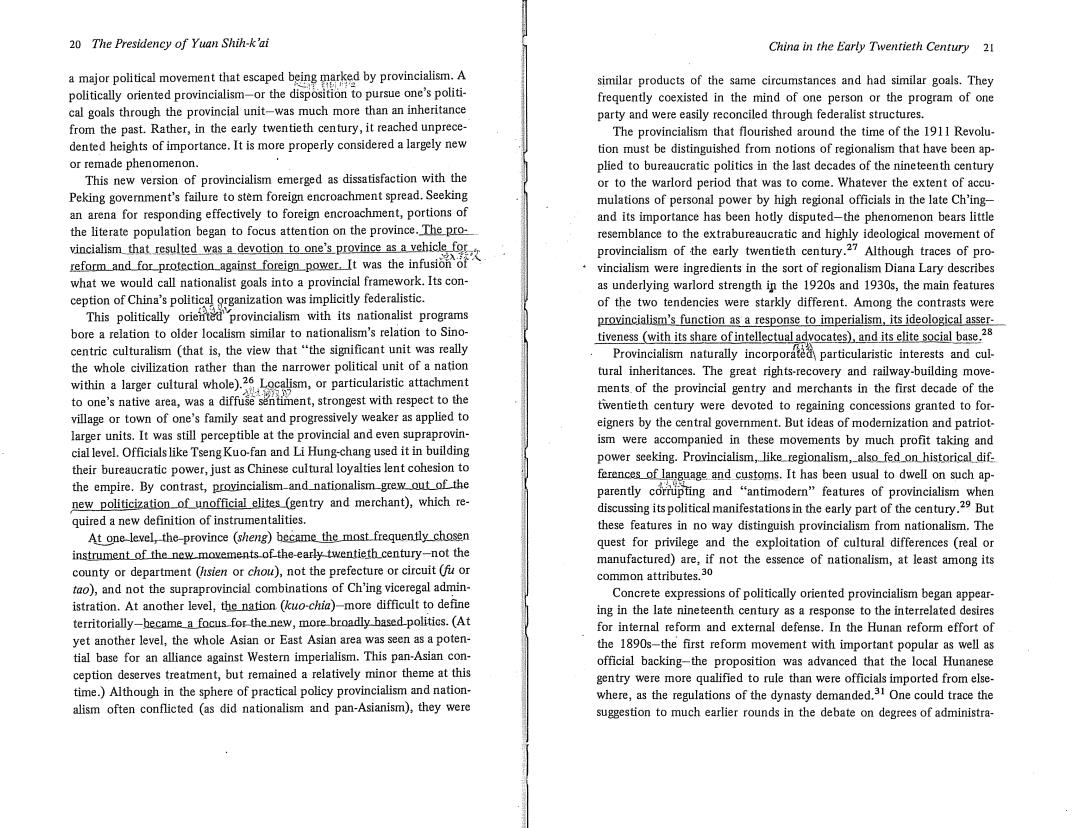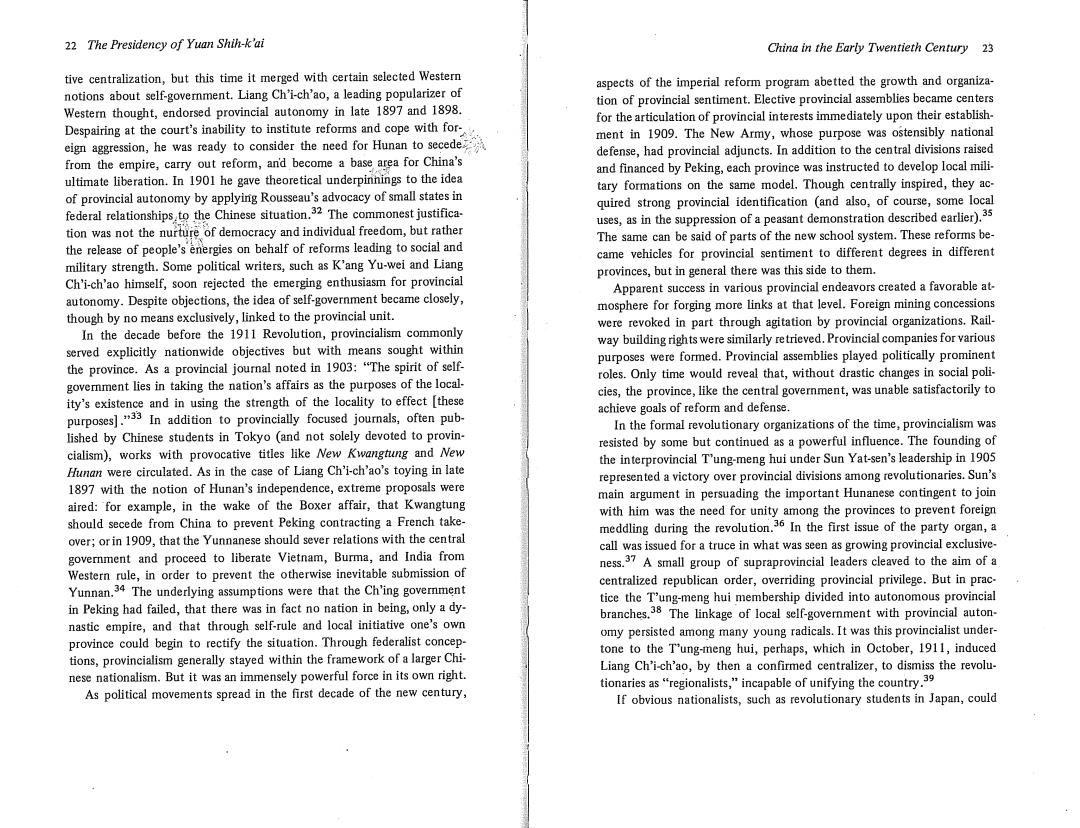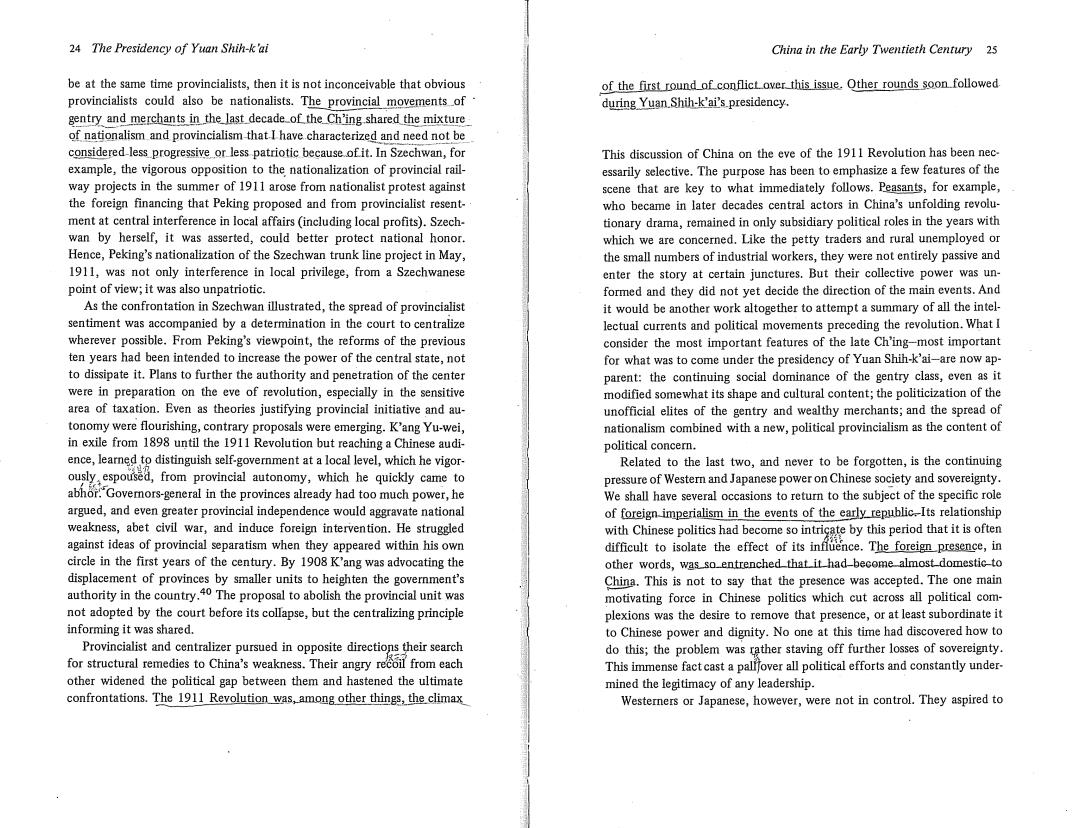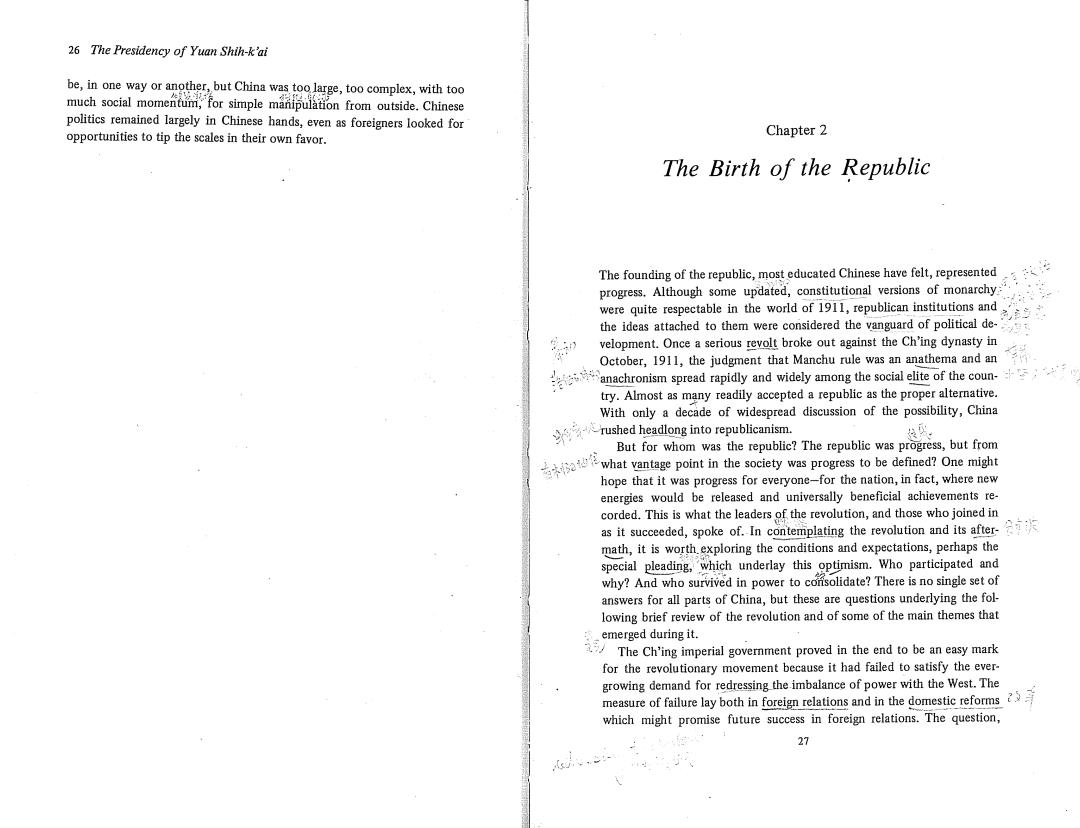
20 The Presidency of Yuan Shih-k'ai China in the Early Twentieth Century 21 a major political movement that escaped being marked by provincialism.A similar products of the same circumstances and had similar goals.They politically oriented provincialism-or the disposition to pursue one's politi- frequently coexisted in the mind of one person or the program of one cal goals through the provincial unit-was much more than an inheritance party and were easily reconciled through federalist structures. from the past.Rather,in the early twentieth century,it reached unprece- The provincialism that flourished around the time of the 1911 Revolu- dented heights of importance.It is more properly considered a largely new tion must be distinguished from notions of regionalism that have been ap- or remade phenomenon. plied to bureaucratic politics in the last decades of the nineteenth century This new version of provincialism emerged as dissatisfaction with the or to the warlord period that was to come.Whatever the extent of accu- Peking goverment's failure to stem foreign encroachment spread.Seeking mulations of personal power by high regional officials in the late Ch'ing- an arena for responding effectively to foreign encroachment,portions of and its importance has been hotly disputed-the phenomenon bears little the literate population began to focus attention on the province.The pro- resemblance to the extrabureaucratic and highly ideological movement of vincialisthat resulted wasadevotion to one's province as a vehic provincialism of the early twentieth century.27 Although traces of pro. reform and for protection against foreign power.It was the infusionf 4 vincialism were ingredients in the sort of regionalism Diana Lary describes what we would call nationalist goals into a provincial framework.Its con- as underlying warlord strength in the 1920s and 1930s,the main features ception of China's political organization was implicitly federalistic. of the two tendencies were starkly different.Among the contrasts were This politically oriented provincialism with its nationalist programs provincialism's function as a response to imperialism,its ideological asser- bore a relation to older localism similar to nationalism's relation to Sino- tiveness(with its share ofintellectualadvocates)and its elite soc base centric culturalism (that is,the view that"the significant unit was really Provincialism naturally incorpor particularistic interests and cul the whole civilization rather than the narrower political unit of a nation within a larger cultural whole).Localsm,or particularistic attachment tural inheritances.The great rights-recovery and railway-building move- ments.of the provincial gentry and merchants in the first decade of the to one's native area,was a diffuse sentiment,strongest with respect to the twentieth century were devoted to regaining concessions granted to for- village or town of one's family seat and progressively weaker as applied to eigners by the central govemment.But ideas of moderization and patriot- larger units.It was still perceptible at the provincial and even supraprovin- ism were accompanied in these movements by much profit taking and cial level.Officials like Tseng Kuo-fan and Li Hung-chang used it in building power seeking.Provincialism,like regionalism,also fed on historical dif- their bureaucratic power,just as Chinese cultural loyalties lent cohesion to ferences of language and customs.It has been usual to dwell on such ap- the empire.By contrast,provincialism-and nationalism grew out of the parently corrupting and "antimodern"features of provincialism when new politicization of unofficial elites_(gentry and merchant),which re- discussing its political manifestations in the early part of the century.29 But quired a new definition of instrumentalities. these features in no way distinguish provincialism from nationalism.The At one-level,the-province (sheng)hecame the most frequently chosen quest for privilege and the exploitation of cultural differences (real or instrument of the new movements of the-early twentieth century-not the manufactured)are,if not the essence of nationalism,at least among its county or department (sien or chou),not the prefecture or circuit (fu or common attributes.30 tao),and not the supraprovincial combinations of Ch'ing viceregal admin- Concrete expressions of politically oriented provincialism began appear- istration.At another level,the nation (kuo-chia)-more difficult to define ing in the late nineteenth century as a response to the interrelated desires territorially-became a focus for the new,more broadly based polities.(At for internal reform and external defense.In the Hunan reform effort of yet another level,the whole Asian or East Asian area was seen as a poten- the 1890s-the first reform movement with important popular as well as tial base for an alliance against Western imperialism.This pan-Asian con- official backing-the proposition was advanced that the local Hunanese ception deserves treatment,but remained a relatively minor theme at this gentry were more qualified to rule than were officials imported from else- time.)Although in the sphere of practical policy provincialism and nation- where,as the regulations of the dynasty demanded.31 One could trace the alism often conflicted (as did nationalism and pan-Asianism),they were suggestion to much earlier rounds in the debate on degrees of administra-

22 The Presidency of Yuan Shih-k'ai China in the Early Twentieth Century 23 tive centralization,but this time it merged with certain selected Western aspects of the imperial reform program abetted the growth and organiza- notions about self-government.Liang Ch'i-ch'ao,a leading popularizer of tion of provincial sentiment.Elective provincial assemblies became centers Western thought,endorsed provincial autonomy in late 1897 and 1898. for the articulation of provincial interests immediately upon their establish- Despairing at the court's inability to institute reforms and cope with for- ment in 1909.The New Army,whose purpose was ostensibly national eign aggression,he was ready to consider the need for Hunan to secede defense,had provincial adjuncts.In addition to the central divisions raised from the empire,carry out reform,and become a base area for China's and financed by Peking,each province was instructed to develop local mili- ultimate liberation.In 1901 he gave theoretical underpinnings to the idea tary formations on the same model.Though centrally inspired,they ac- of provincial autonomy by applying Rousseau's advocacy of small states in quired strong provincial identification (and also,of course,some local federal relationships to the Chinese situation.32 The commonest justifica- tion was not the nurture of democracy and individual freedom,but rather uses,as in the suppression of a peasant demonstration described earlier).35 The same can be said of parts of the new school system.These reforms be- the release of people's energies on behalf of reforms leading to social and came vehicles for provincial sentiment to different degrees in different military strength.Some political writers,such as K'ang Yu-wei and Liang provinces,but in general there was this side to them. Ch'i-ch'ao himself,soon rejected the emerging enthusiasm for provincial Apparent success in various provincial endeavors created a favorable at- autonomy.Despite objections,the idea of self-government became closely, mosphere for forging more links at that level.Foreign mining concessions though by no means exclusively,linked to the provincial unit. were revoked in part through agitation by provincial organizations.Rail- In the decade before the 1911 Revolution,provincialism commonly way building rights were similarly retrieved.Provincial companies for various served explicitly nationwide objectives but with means sought within purposes were formed.Provincial assemblies played politically prominent the province.As a provincial journal noted in 1903:"The spirit of self- roles.Only time would reveal that,without drastic changes in social poli- government lies in taking the nation's affairs as the purposes of the local- cies,the province,like the central government,was unable satisfactorily to ity's existence and in using the strength of the locality to effect [these purposes]3 In addition to provincially focused joumals,often pub- achieve goals of reform and defense. In the formal revolutionary organizations of the time,provincialism was lished by Chinese students in Tokyo (and not solely devoted to provin- resisted by some but continued as a powerful influence.The founding of cialism),works with provocative titles like New Kwangtung and New the interprovincial T'ung-meng hui under Sun Yat-sen's leadership in 1905 Hunan were circulated.As in the case of Liang Ch'i-ch'ao's toying in late represented a victory over provincial divisions among revolutionaries.Sun's 1897 with the notion of Hunan's independence,extreme proposals were main argument in persuading the important Hunanese contingent to join aired:for example,in the wake of the Boxer affair,that Kwangtung with him was the need for unity among the provinces to prevent foreign should secede from China to prevent Peking contracting a French take- meddling during the revolution.36 In the first issue of the party organ,a over;or in 1909,that the Yunnanese should sever relations with the central call was issued for a truce in what was seen as growing provincial exclusive- government and proceed to liberate Vietnam,Burma,and India from ness.37 A small group of supraprovincial leaders cleaved to the aim of a Western rule,in order to prevent the otherwise inevitable submission of centralized republican order,overriding provincial privilege.But in prac. Yunnan.34 The underlying assumptions were that the Ch'ing government tice the T'ung-meng hui membership divided into autonomous provincial in Peking had failed,that there was in fact no nation in being,only a dy- branches.38 The linkage of local self-government with provincial auton- nastic empire,and that through self-rule and local initiative one's own omy persisted among many young radicals.It was this provincialist under- province could begin to rectify the situation.Through federalist concep- tone to the T'ung-meng hui,perhaps,which in October,1911,induced tions,provincialism generally stayed within the framework of a larger Chi- Liang Ch'i-ch'ao,by then a confirmed centralizer,to dismiss the revolu- nese nationalism.But it was an immensely powerful force in its own right. As political movements spread in the first decade of the new century, tionaries asronistsincpabe of unifying the oury If obvious nationalists,such as revolutionary students in Japan,could

24 The Presidency of Yuan Shih-k'ai China in the Early Twentieth Century 25 be at the same time provincialists,then it is not inconceivable that obvious of the first round of conflict over this issue.Other rounds soon followed provincialists could also be nationalists.The provincial movements of during Yuan Shih-k'ai's presidency. gentry and merchants in the last decade of the Ch'ing shared the mixture of nationalism and provincialism -that I have characterized and need not be considered-less progressive or less patriotic because ofit.In Szechwan,for This discussion of China on the eve of the 1911 Revolution has been nec. example,the vigorous opposition to the nationalization of provincial rail- essarily selective.The purpose has been to emphasize a few features of the way projects in the summer of 1911 arose from nationalist protest against scene that are key to what immediately follows.Peasants,for example, the foreign financing that Peking proposed and from provincialist resent- who became in later decades central actors in China's unfolding revolu- ment at central interference in local affairs(including local profits).Szech- tionary drama,remained in only subsidiary political roles in the years with wan by herself,it was asserted,could better protect national honor. which we are concerned.Like the petty traders and rural unemployed or Hence,Peking's nationalization of the Szechwan trunk line project in May, the small numbers of industrial workers,they were not entirely passive and 1911,was not only interference in local privilege,from a Szechwanese enter the story at certain junctures.But their collective power was un- point of view;it was also unpatriotic. formed and they did not yet decide the direction of the main events.And As the confrontation in Szechwan illustrated,the spread of provincialist it would be another work altogether to attempt a summary of all the intel- sentiment was accompanied by a determination in the court to centralize lectual currents and political movements preceding the revolution.What I wherever possible.From Peking's viewpoint,the reforms of the previous consider the most important features of the late Ch'ing-most important ten years had been intended to increase the power of the central state,not for what was to come under the presidency of Yuan Shih-k'ai-are now ap- to dissipate it.Plans to further the authority and penetration of the center parent:the continuing social dominance of the gentry class,even as it were in preparation on the eve of revolution,especially in the sensitive modified somewhat its shape and cultural content;the politicization of the area of taxation.Even as theories justifying provincial initiative and au- unofficial elites of the gentry and wealthy merchants;and the spread of tonomy were flourishing,contrary proposals were emerging.K'ang Yu-wei, nationalism combined with a new,political provincialism as the content of in exile from 1898 until the 1911 Revolution but reaching a Chinese audi- political concern. ence,learned to distinguish self-government at a local level,which he vigor- Related to the last two,and never to be forgotten,is the continuing ously,espoused,from provincial autonomy,which he quickly came to pressure of Western and Japanese power on Chinese society and sovereignty. abhor.Govemors-general in the provinces already had too much power,he We shall have several occasions to return to the subject of the specific role argued,and even greater provincial independence would aggravate national of foreign-imperialism in the events of the early republic.-Its relationship weakness,abet civil war,and induce foreign intervention.He struggled with Chinese politics had become so intricate by this period that it is often against ideas of provincial separatism when they appeared within his own difficult to isolate the effect of its inffuence.The foreign presence,in circle in the first years of the century.By 1908 K'ang was advocating the other words,was so_entrenched that it had-become almost domestic-to displacement of provinces by smaller units to heighten the government's China.This is not to say that the presence was accepted.The one main authority in the country.40 The proposal to abolish the provincial unit was motivating force in Chinese politics which cut across all political com- not adopted by the court before its collapse,but the centralizing principle plexions was the desire to remove that presence,or at least subordinate it informing it was shared. to Chinese power and dignity.No one at this time had discovered how to Provincialist and centralizer pursued in opposite directions their search do this;the problem was rather staving off further losses of sovereignty. for structural remedies to China's weakness.Their angry recoil from each This immense fact cast a pallfover all political efforts and constantly under- other widened the political gap between them and hastened the ultimate mined the legitimacy of any leadership. confrontations.The 1911 Revolution was,among other things,the climax Westerners or Japanese,however,were not in control.They aspired to

26 The Presidency of Yuan Shih-k'ai be,in one way or another,but China was too large,too complex,with too much social momentum,for simple manipulation from outside.Chinese politics remained largely in Chinese hands,even as foreigners looked for opportunities to tip the scales in their own favor. Chapter 2 The Birth of the Republic The founding of the republic,moe Chinese have fel,represened progress.Although some updated,constitutional versions of monarchy: were quite respectable in the world of 1911,republican institutions and the ideas attached to them were odered the vanguard of political de velopment.Once a serious revolt broke out against the Ch'ing dynasty in October,1911,the judgment that Manchu rule was an anathema and an nachronism pread rapidly and widely among the socaet of the coun try.Almost as many readily accepted a republic as the proper alternative. With only a decade of widespread discussion of the possibility,China uhed headllongintorepuic But for whom was the republic?The republic was progress,but from point in the otrotbe dee hope that it was progress for everyone-for the nation,in fact,where new energies would be released and universally beneficial achievements re- corded.This is what the leaders of the revolution,and those who joined in as it succeeded,spoke of.In contemplating the revolution and its afte math,it is worth.exploring the conditions and expectations,perhaps the special pleading,which underlay this optimism.Who participated and why?And who survived in power to consolidate?There is no single set of answers for all parts of China,but these are questions underlying the fol- lowing brief review of the revolution and of some of the main themes that emerged during it. The Ch'ing imperial government proved in the end to be an easy mark for the revolutionary movement because it had failed to satisfy the ever- growing demand for redressing the imbalance of power with the West.The measure of failure lay both in foreign relations and in the omesticfo which might promise future success in foreign relations.The question, 27

28 The Presidency of Yuan Shih-k'ai Provinces with revolutionary govern- "How can China acquire the wealth and power to save herself?"eventually raised the question,Ch'ing government a conibuo or an impedi- ments in the provincial capital by early December,1911 RUSSIA ment to national salvation?"As the government raced to meet the rising Nore.-The government of Shantung had declared expectations of performance (an aspect of the spread of nationalism),it its independence of Peking in November,1911. A precipitated new conctwithin the socey,disposed Chineseo but rescinded this act after eleven days.The capital further the virtue of the existinger Spesueenfo of Shansi was cocupied by Ch'ing troops in De- HEILUNGCHIANGO cember,1911,and was not retured to revolu- eign relations or domestic remodeling might have contained the conflicts. tionary forces until the overall settlement. But by 1911 expectations were such that the modest successes of the pre- vious decade,though surpassing anything since the Opium War,were insuf. KIRIN ficient to stem disaffection.Domestic conflict,therefore,occupied center OUTER MONGOLIA stage. M Like the reforms of the late Ch'ing,the 1911 Revolution was an affair CHIHLI FENGTIEN Mukden ultimately dominated by the elite social strata.In most places(I shall note Peking some important exceptions)revolution was achieved not by mass force but by soup'ett,not bya great social tumol where the comfict of c Tientsin( Talien (J.) interests produces a reordering of privilege,but by the rapid defection of Tsinan most leading social elements,with social conflict contained.Agitated for TSINGHAI KANSU the most part by China's political failure rather,than social injustice,the SHANTUNG Tsingtao (Ger.) Lanchow formal revolutionary leadership worked to dampendown any evidences Kaifeng that the social order was combustible.Where alliances had been struckdur HONAN ing the revolution with lower class groups (secret societies,bandits),con- certed efforts were made almost everywhere after the revolution to sever Shanghal the alliance and reimpose their subordination.Within five months the ef- forts had succeeded. Aside from small numbers at the very peak of the Ch'ing political sys- tem and apart from the casualties of the revolutionary violence,most life patterns were not profoundly altered by the experience of 1911.The vil- lages were particularly untouched,though there might have been a great deal of gentry uneasiness about them during the uncertainty of the revolu- tion.Commerce was only briefly interrupted and recovery was rapid. TAIWAN (J.) Those who were pursuing new educational or professional careers,if they Hongkong (Br.) had been diverted by the revolution,seemed generally to have returned Hanoi shortly to their prerevolutionary pattern once the settlement came.In.con- NDOCHINA trast to the May-Fourth-Movement,which was a turning point in the lives (Fr.) of many in the elite,the 1911 Revolution was for most only an incident, an interruption.This would not have been obvious during the excitement that accompanied the revolution.Enthusiasm was great among those in- volved,from the turbulence in Szechwan in the summer of 1911,to the Revolutionary Provinces in 1911